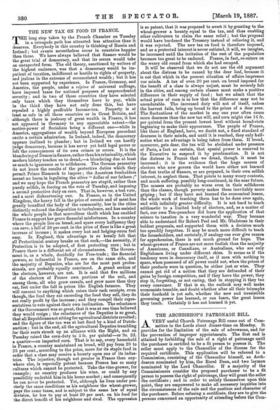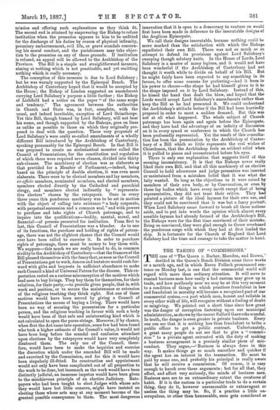THE ARCHBISHOP'S PATRONAGE BILL.
AVERY useful Church Patronage Bill came out of Com- mittee in the Lords about dinner-time on Monday. It provides for the limitation of the sale of advowsons, and for the prevention of improper appointments. The first end is attained by forbidding the sale of a right of patronage until the purchaser is certified to be a fit person to possess it. The seller must apply to the Chancellor of the diocese for the required certificate. This application will be referred to a Commission, consisting of the Chancellor himself, an Arch- deacon nominated by him, the Rural Dean, and two laymen nominated by the Lord Chancellor. If a majority of the Commissioners consider the proposed purchaser to be a fit person to possess the right of patronage, they will grant the seller the certificate ; and in order to satisfy themselves upon this point, they are empowered to make all necessary inquiries into the circumstances of the sale and the position and character of the purchaser. Before refusing a certificate, they are to give the persons concerned an opportunity of attending before the Coin-
mission and offering such explanations as they think fit. The second end is attained by empowering the Bishop to refuse institution when the presentee appears to him to be unfitted for the discharge of his duties by reason of physical infirmity, pecuniary embarrassment, evil life, or grave scandals concern- ing his moral conduct, and the parishioners may take objec- tion to the presentee on any of these grounds. If institution is refused, an appeal will be allowed to the Archbishop of the Province. The Bill is a simple and straightforward measure, aiming at nothing which is not practicable, and yet omitting nothing which is really necessary.
The conception of this measure is due to Lord Salisbury ; but he was warmly supported by the Episcopal Bench. The Archbishop of Canterbury hoped that it would be accepted by the House ; the Bishop of London suggested an amendment carrying Lord Salisbury's purpose a little further ; the Bishop of Lichfield had a notice on the paper " of the same scope and tendency." The agreement between the authorities in Church and State was, in fact, complete, with the usual, and indeed inevitable, exception of Lord Grimthorpe. Yet this Bill, though framed by Lord Salisbury, will not bear his name, and though supported by the Bishops, goes on lines as unlike as possible to those on which they originally pro- posed to deal with the question. These very proposals of Lord Salisbury's were really so-called amendments of a wholly different Bill introduced by the Archbishop of Canterbury, speaking presumably for the Episcopal Bench. In that Bill it was proposed to create an ecclesiastical monster called the Council of Presentations, for the constitution and regulation of which there were required seven clauses, divided into thirty sub-clauses. The machinery of election was as elaborate as that provided for a Member of Parliament,—indeed, being based on the principle of double election, it was even more elaborate, There were to be clerical members and lay members, ex-o,fficio members, nominated members, and elected members, members elected directly by the Cathedral and parochial clergy, and members elected indirectly by "representa- tive electors" chosen by the ratepayers. Once in every three years this ponderous machinery was to be set in motion with the object of calling into existence "a body corporate, with perpetual succession and a common seal," and with powers to purchase and take rights of Church patronage, and to inquire into the qualifications—bodily, mental, moral, and financial—of persons presented for institution. From first to last, this Council of Presentations was a blunder. As to one of its functions, the purchase and holding of rights of patron- age, there was not the slightest chance that the Council would ever have been called to exercise it. In order to purchase rights of patronage, there must be money to buy them with. We suppose—this much we are really bound to do, in common civility to the Archbishop of Canterbury—that the framers of the Bill pleased themselves with the fancy that, as soon as the Council of Presentations got to work, donors and testators would rush for- ward with gifts and bequests in sufficient abundance to make each Council a kind of Universal Patron for the diocese. This ex- pectation rested on a curious misconception of the motives which lead men to buy livings. They buy them for themselves, for their relatives, for their party,—to provide given people, that is, with work and position, or to secure the maintenance or extension of the religious teaching they think right. Not one of these motives would have been served by giving a Council of Presentations the means of buying a living. There would have been no way of securing the presentation for a particular person, and the religious teaching in favour with such a body would have been of that safe and uninteresting kind which is not calculated to open the purse-strings. Moreover, if by chance, when first the Act came into operation, some few had been found who took a higher estimate of the Council's value, it would not have been long before the scandal and confusion attendant upon elections by the ratepayers would have very completely disabused them. The only use of the Council, there- fore, would have been to make the inquiries and exercise the discretion which under the amended Bill will be made and exercised by the Commission, and for this it would have been singularly ill-fitted. Its construction and appointment would not only have been complicated out of all proportion to the work to be done, but inasmuch as the work would have been distinctly judicial, an immense impetus would have been given to the mischievous principle of an elective Judiciary. Rate- payers who had been taught to elect Judges with whose acts they would have but little concern, might have insisted on electing those whose acts may at any moment become of the greatest possible consequence to them. The most dangerous
innovation that it is open to a democracy to venture on would first have been made in deference to the inscrutable designs of the Anglican Episcopate.
We call their designs inscrutable, because nothing could be more marked than the satisfaction with which the Bishops repudiated their own BilL There was not so much as an attempt to defend its provisions against Lord Salisbury's sweeping though salutary knife. In the House of Lords, Lord Salisbury is a master of many legions, and it would not have been wonderful if the Archbishop of Canterbury had not thought it worth while to divide on behalf of his Bill. But he might fairly have been expected to say something in its favour, to offer some reasons for preferring—had it been in his power to choose—the shape he had himself given to it to the shape imposed on it by Lord Salisbury. Instead of thin, he kissed the hand that dealt the blow, and hoped that the Lords would accept Lord Salisbury's amendments rather than keep the Bill as he had presented it. We could understand the Archbishop's attitude better if the Bill had been hurriedly prepared in order to meet a sudden demand. But this was not at all what happened. The whole subject of Church patronage has been again and again before the Episcopate, and they have had the advantage of an infinity of discussion on it in every synod or conference in which the Church has been professedly represented. Yet the result of this consulta- tion has been the presentation by the Archbishop of Canter- bury of a Bill which so little represents the real wishes of Churchmen, that the Archbishop feels an evident relief when it is pulled to pieces and reconstructed before his eyes.
There is only one explanation that suggests itself of this seeming inconsistency. It is that the Bishops never really liked their own Bill, and that all this machinery of an elective Council to hold advowsons and judge presentees was inserted or maintained from a mistaken belief that it was what the laity wanted. So long as the objections to it were raised by members of their own body, or by Convocation, or even by those lay bodies which have every merit except that of being representative, they did not trust their critics. They had painted a picture of the ideal layman for their own use, and they could not be convinced that it was but a fancy portrait. When Lord Salisbury came forward to brush all these notions aside, and to put into words the opinion which almost every sensible layman had already formed of the Archbishop's Bill, the Bishops were for the first time convinced of their mistake. Being so convinced, they were glad enough to throw overboard the ponderous cargo with which they had at first loaded the ship. It is fortunate for the Church of England that Lord Salisbury had the time and courage to take the matter in hand.



































 Previous page
Previous page